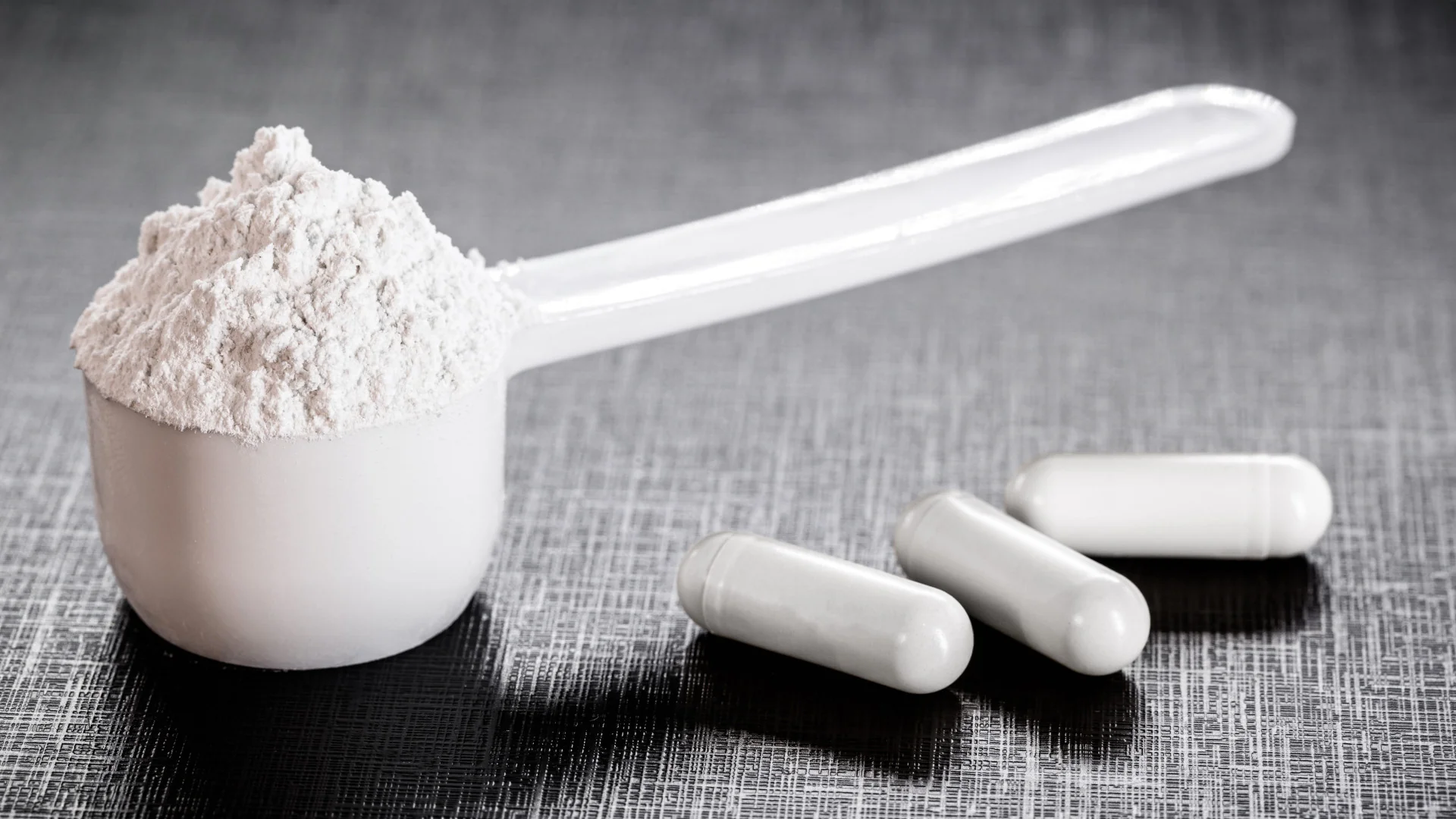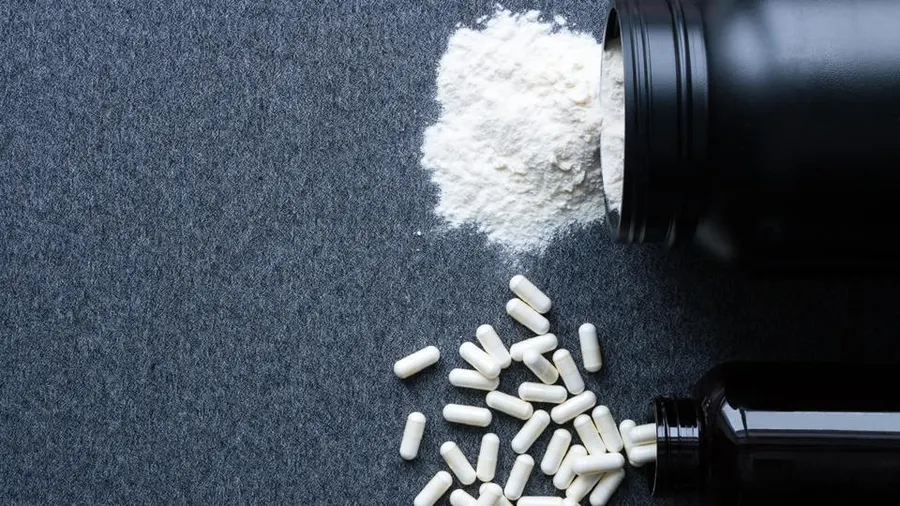Creatine is an amino acid derivate that occurs naturally in our body, mainly in the liver, and to a lesser extent in the kidneys and pancreas. Approximately 95% of creatine is stored in the skeletal muscles. The other 5% is distributed in the brain and testes. Although it is possible to obtain part of the recommended daily intake through foods such as seafood, red meat and fatty fish, the main drawback is that it is difficult to consume enough of these foods on a daily basis to cover the need for creatine with ergogenic effects.
The Amino Acids
L-Arginine:
Role in the body: It’s a semi-essential amino acid that plays a crucial role in various physiological processes. One of its main functions is in the production of nitric oxide (NO). It helps dilate blood vessels, improving circulation and supporting cardiovascular health.
Exercise and performance: Commonly used in pre-workout supplements. This is because it can enhance blood flow, improve oxygen and nutrient delivery to muscles, and potentially enhance exercise performance.
Glycine:
Role in the body: Glycine is a non-essential amino acid that is critical for the synthesis of proteins, collagen, and other important molecules like creatine. It also acts as a neurotransmitter in the central nervous system, where it has calming and inhibitory effects, promoting relaxation and better sleep.
Health benefits: It supports muscle repair, skin health (due to its role in collagen formation), and may have benefits for sleep quality and cognitive function. It also has a detoxifying role in the liver and helps regulate blood sugar levels.
L-Methionine:
Role in the body: It is an essential amino acid involved in the synthesis of proteins and other important molecules. It is a precursor to S-adenosylmethionine (SAMe), which plays a role in methylation processes, affecting DNA synthesis, detoxification, and cellular repair.
Antioxidant function: L-Methionine is important for producing glutathione, a powerful antioxidant that helps protect cells from damage caused by free radicals.
Liver function and fat metabolism: It aids in fat metabolism and liver detoxification, making it essential for maintaining liver health.
How does it works in the body?
Its main function is to store phosphate groups in the form of phosphocreatine. These phosphate groups are transferred to adenosine diphosphate (ADP) to regenerate adenosine triphosphate (ATP), which is the main energy carrier in cells and the key source of fuel for high-intensity activities.
Creatine supplementation increases phosphocreatine levels in cells. That allows more phosphate groups to be donated to ADP and accelerates the recycling of ADP into ATP. Thereby increasing the energy available for high-intensity exercise. This increased energy availability can help improve strength and power during training.
What are the benefits for athletes and non-athletes?
Benefits for athletes
- Endurance, muscle size and performance. The use of oral creatine may allow an athlete to work harder during repetitions or short sprints, resulting in greater strength, muscle mass and performance gains. Creatine is often used by athletes who participate in high-intensity activities that require rapid recovery during training and competition.
- Injury prevention. Oral creatine may reduce the frequency of dehydration, muscle cramps, and injuries to muscles, bones, ligaments, tendons, and nerves.
- Supplemented creatine has an indisputable effect on the accumulation of muscle creatine, which means an optimization, as we have seen before, of energy utilization when we perform a muscular exercise that requires ATP from much faster pathways than glycolysis.
- In workouts in which weight lifting is prioritized, such as crossfit, the main energy is obtained through the primary metabolic pathway of phosphocreatine, but if the muscle fatigues because it is not able to generate more ATP through this pathway, the loss of power and starting strength begins. Creatine can help compensate for this loss, and in fact scientific evidence has shown that its consumption can increase strength by approximately 8%, as well as a 14% improvement in performance, and can increase the number of repetitions at maximum possible power.
- Sarcopenia and bone health. Creatine supplementation may help counteract age-related declines in musculoskeletal and bone mineral density.
Benefits for non-athletes
- Skin aging. Early research suggests that applying a cream containing creatine and other ingredients to the face every day for six weeks may reduce skin sagging and wrinkling in men. Another study suggests that a cream with creatine and folic acid improves sun damage and reduces wrinkles.
- Energy and vitality: Increases energy production in cells, which can make you feel more active and less fatigued in your day-to-day life.
- Cognition and brain health. Creatine supplements may improve performance during cognitive tasks, especially in older adults.
- Rare creatine metabolism syndromes. In children with certain creatine deficiency syndromes, oral creatine supplements may improve some symptoms.
- Muscle Health Support: Even if you don’t exercise intensely, creatine can help maintain and protect your muscle mass.
When should you take creatine?
There is research that recommends taking creatine 15 to 30 minutes before or after training. However, at the end of the day, consistency is the key. It is much more important to focus on not missing your daily creatine supplement than it is to focus on when to take it. In few words, you can recommend your clients having a regular intake is what leads to an increase in muscle stores. Most people will be able to benefit from its positive effects, achieving an increase of intracellular creatine of between 15% and 20% through supplementation. Its effects usually start to be noticed after the first week.
Myths about Creatine
Creatine damages the kidneys: A widespread myth is that creatine can damage the kidneys. However, numerous studies have shown that creatine does not adversely affect kidney function in healthy people. Even so, it is always advisable to have regular check-ups to monitor overall health.
Creatine retains fluids: Creatine is commonly believed to cause fluid retention and bloating. Although creatine increases water retention inside muscle cells (intracellular retention), this should not be confused with subcutaneous retention, which does cause bloating. In fact, this intracellular retention contributes to muscle bulking without negatively affecting physical appearance.
Creatine excessively increases muscle: Some people think that creatine causes excessive muscle growth, similar to the effects of anabolic steroids. In reality, creatine enhances performance during exercise, supporting gradual muscle growth that occurs in combination with proper training and a balanced diet.
Intake recommendations to be taken into account: Nutrition professionals should take into account all individual patient factors, such as goals, sport discipline, and general health status, when recommending creatine supplementation. It is essential to closely monitor the effects and make any necessary adjustments to ensure maximum safety and efficacy of creatine use.
Boost your brand with our high-quality creatine: One of the most researched key ingredients to improve performance and muscle recovery. A great addition to your product assortment!
Contact our team of experts about all formulations we are able to produce for you!


